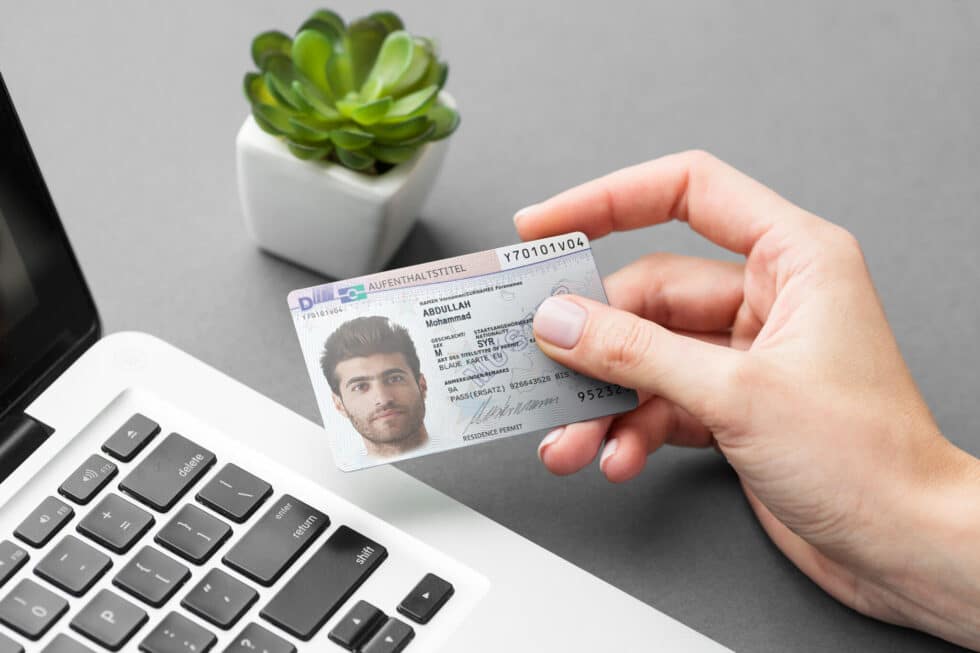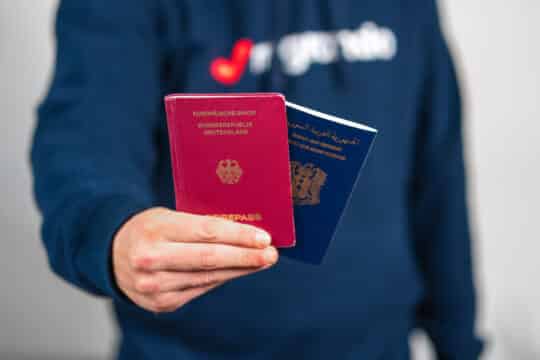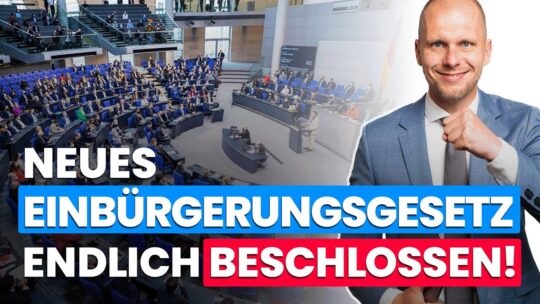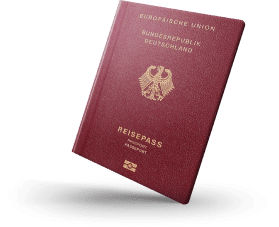EU Blue Card: The background
It is important to start by finding out the background to the EU Blue Card. The history of the residence permit is closely linked to the title itself. At the same time, it is essential to know why the EU Blue Card was created in the first place Residence permit and what exactly the aim of creating this residence permit was.
EU Blue Card: The history
The EU Blue Card has its origins in the European Union's Lisbon Strategy of 2000, which aimed to make the EU even more competitive in the future. The aim was to increase productivity and the speed of innovation in the EU member states and in the Union as a whole. The EU wanted to be a role model for economic, social and ecological recovery. The strategy was to consist of the fields of environmental protection, knowledge society and innovation.
The EU realized that support was needed to implement these goals. Directive 2009/50/EC was therefore drafted. This stipulated that highly qualified workers from third countries were necessary to achieve the Lisbon Strategy. Over time, this idea developed into the EU Blue Card. The Lisbon Strategy was replaced by the Europe 2020 project in 2010.
Meaning of the EU blue card
From the very beginning, the EU Blue Card was intended to attract highly qualified workers to the European labor market and to overcome the challenges Europe faces in the future. This includes solving Europe's demographic problems.
The European population has been getting steadily older since 2010 and this has increased again in recent years. The EU blue card and highly qualified young professionals from third countries who settle in Europe to work are therefore being relied upon.
Another important point, which was also at the heart of the Lisbon Strategy, is the area of innovation. Through the immigration of qualified specialists with university degrees, the EU also hopes to benefit from innovation, which is higher in some third countries than in the EU.
At the same time, the aim is to combat the constant shortage of skilled workers, which affects many other EU countries in addition to Germany. In areas where there is a particular shortage, more skilled workers are being sought via the EU Blue Card, who can then be deployed as skilled workers.

EU Blue Card: The 6 innovations
The Skilled Immigration Act introduces innovations for the EU Blue Card. The law is to be implemented gradually from November according to the German government's plan. The new law means a number of changes for the blue card. There are simplifications for people applying for the EU Blue Card as well as for holders of the residence permit.
Innovation 1: Reduction of the earnings limit for the blue card
The new Skilled Immigration Act provides for the earnings threshold for the EU Blue Card to be lowered. The German government is basing this on the EU Directive EU 2021/1883. From November 2023, the minimum earnings threshold for the Blue Card will be lowered from 4886.67 euros gross annual salary to 43,800 euros gross. For bottleneck occupations and young professionals, the proof of earnings will be reduced from 45,542 euros gross annual salary to 39,682 euros gross
Innovation 2: More people can apply for the blue card
From November, more foreign skilled workers will also have the opportunity to apply for the EU Blue Card under the new Skilled Immigration Act.
In future, it will be possible for foreigners who have completed a university degree within the last three years to apply for an EU Blue Card if they are employed in Germany and earn a minimum salary of 45.03% of the annual contribution assessment threshold for the pension system. This is the case with a gross annual salary of 39,682 euros. It does not matter whether you work in a shortage occupation or a standard occupation.
Innovation 3: Changes for IT specialists
Under the new Skilled Immigration Act, IT specialists can obtain a blue card even without a university degree. The condition is that at least 3 years of professional experience can be proven. The earnings limit will be 39,682 euros gross annual salary.
The reason for this is that IT specialists and skilled workers are urgently needed in the IT sector and there is a particularly high shortage of skilled workers in this profession in Germany. With the new regulation, professional experience of 3 years or more will be sufficient in future. The more professional experience you have, the easier it is to obtain the blue card.
Innovation 4: Number of shortage occupations is increased
Furthermore, the number of shortage occupations will be expanded with the new Skilled Immigration Act. In future, the following occupational groups will be classified as shortage occupations: veterinarians, pharmacists, nurses and obstetricians, teachers and educators, childcare and healthcare, specialists in information and communication technology, managers in the manufacture and production of goods in mining, construction and logistics.
Innovation 5: Mobility with the Blue Card
With the new law, there are also innovations in the mobility of people who have an EU Blue Card. If you have an EU Blue Card from an EU member state, there are two different types of mobility: short-term and long-term mobility.
Short-term mobility is valid for a stay of 90 days. You may come to Germany with your Residence permit and stay for the purpose of doing business. You do not need a visa or a work permit from the Federal Employment Agency.
Long-term mobility applies if you stay in Germany for more than 12 months. This is the minimum stay. You can then move to Germany long-term with a blue card from another EU member state and do not need a visa. You must then apply for an EU blue card for Germany at Foreigners' office after your arrival in Germany.
Innovation 6: Easier family reunification with a blue card
The new Skilled Immigration Act makes it easier for family members to join EU Blue Card holders. The decisive factor is that blue card holders have already lived with their family in another EU member state. The regulation is then privileged and when issuing a residence permit for the family member, no proof of accommodation according to § 29 Para . 1 No. 2 AufenthG and no proof of means of subsistence according to § 5 Para. 1 No. 1 AufenthG is required.
Naturalization EU Blue Card?
Condition for the EU blue card
The EU Blue Card according to §18b AufenthG is subject to certain conditions. It is important to know these conditions if you want to apply for an EU Blue Card and come to Germany in this way.
Educational certificates and diplomas
The most important point for an EU Blue Card is a completed degree. It is not possible to obtain an EU Blue Card without a degree. The new Skilled Immigration Act means that IT specialists will be an exception in future. For them, 3 years of professional experience without a degree will be sufficient. In general, however, a university degree is a basic requirement for the EU Blue Card.
Proof of an employment contract
Another very important point is that you must be able to present an employment contract with a German company. It is important that your employer has a permanent establishment in Germany. As an alternative to the employment contract, you can also present a job confirmation. This will be accepted as an alternative document.
Without an employment contract, you will not be able to obtain an EU Blue Card. The employment contract is crucial for you to obtain the Residence permit in accordance with 18b AufenthG.
Proof of minimum salary
The immigration of foreign skilled workers is currently regulated by the blue card. At present, the gross earnings limit for the blue card is 4886.67 euros, which equates to 58,400 euros gross per year. Skilled workers who work in a shortage occupation are exempt from this earnings limit. These skilled workers must currently prove gross earnings of 3796 euros or 45,542 euros for the blue card.
The new Skilled Immigration Act, which comes into force in November, will lower the minimum salary thresholds. This means that in future, if you apply for an EU Blue Card, you will have to prove that you have less income from your work.
Proof of residence
If you already live in Germany and are in possession of a student visa in accordance with § 16b AufenthG, you must provide proof of residence. It is sufficient to submit a certificate of registration (the so-called registration confirmation). Alternatively, the tenancy agreement or confirmation of moving in from the landlord will also be accepted.
Identity documents
You must be able to prove your identity when applying for the EU Blue Card. This can be done with a national passport or an identity card. Alternatively, you can also use alternative documents if you can prove that it is objectively impossible and subjectively unreasonable for you to obtain a passport. You will then need written confirmation of this and submit this with the alternative document.
Further documents
Other documents you will need for health insurance are proof of your health insurance and proof that you regularly pay into the health insurance fund (account overview). It is also important that you can provide a certificate of insurance from the health insurance company that insures you.
If you have an employment contract or job confirmation in a shortage occupation and your monthly gross salary is less than 3796 euros, you will need approval from the Federal Employment Agency to obtain an EU Blue Card.

EU Blue Card: The advantages
The EU Blue Card brings various advantages for foreigners. It gives you more freedom in different areas than other residence permits. An EU Blue Card is helpful for various integration processes in Germany.
Simpler Naturalization
Naturalization with an Residence permit EU Blue Card in accordance with Section 18b AufenthG is easier than with other residence permits. The reason for this is that the German state actively supports the Naturalization of skilled workers with an employment contract. Various sectors in Germany need skilled workers and would have massive problems without foreign skilled workers.
For this reason, the process may be simpler under certain circumstances. Conditions for Naturalization , such as securing your livelihood, are also part of the EU Blue Card. This means that you already meet some of the requirements and do not have to meet as many.
Family reunification is easier
Family reunification is much easier with a Residence permit in accordance with § 18b AufenthG than with other residence permits. Due to the income limits for the EU Blue Card, you already have the financial requirements for family reunification. In addition, with an EU Blue Card, your spouse can apply for a residence permit in Germany without prior language skills and is also entitled to work in Germany.
The new Skilled Immigration Act provides further relief. This applies to people with an EU Blue Card issued by another EU member state and who have lived with their family in another EU member state.
Mobility within the EU with an EU Blue Card
The EU Blue Card enables greater mobility and freedom of movement within the EU. While you are severely restricted with other Residence permit , you can move more freely within the EU with a Residence permit in accordance with 18b AufenthG.
Better integration
Integration with a Residence permit in accordance with 18b AufenthG is easier for you. The EU Blue Card requires that you already have an employment contract. By working, you pay into the German social security and pension system every month. In this way, you bring important added value to German society as a whole and show great proof of integration.
With the EU Blue Card, you are recognized as a skilled worker. As Germany is in great need of skilled workers, support on the path to integration is easier than with other residence permits. Your employer has a great interest in promoting and supporting you in the integration steps in various ways, and the same applies to the German state.

Traveling with the EU Blue Card
The EU Blue Card makes it easier to travel to different countries than is the case with other residence permits. This point is part of easier mobility with the blue card. It applies not only to business travel, but also to travel for tourism purposes.
Visa-free travel to these countries is possible
As a general rule, you can travel to another Schengen state for up to 90 days within a 190-day period. The Schengen states are the following countries: Austria, Belgium, Croatia, the Czech Republic, Denmark, Estonia, Finland, Greece, Hungary, Iceland, Italy, Latvia, Liechtenstein, Lithuania, Luxembourg, Malta, the Netherlands, Norway, Poland, Portugal, Slovakia, Slovenia, Spain, Sweden and Switzerland.
The EU Blue Card therefore allows you to move and travel freely without a visa in the majority of European countries. A privilege that you do not have with other residence permits.
Visa-free travel is not possible for these countries
You cannot enter all countries that do not belong to the Schengen area without a visa. Here you must apply for a visa with an EU Blue Card. One point is important here: if you stay in a non-EU country for 12 consecutive months, your EU Blue Card and therefore your Residence permit will expire. You can apply for an extension. You must prove that extending your stay outside the Schengen area is in the interests of the Federal Republic of Germany. A justified reason may be an assignment abroad for work.
EU Blue Card: advice on how to apply
There are certain steps you can take incorrectly when applying for an EU Blue Card. This makes it all the more important to avoid simple mistakes. There are also a few simple tips to help your application go smoothly.
EU Blue Card: The steps to the application
In general, the more proof you provide, the better. This applies to proof of the minimum income threshold as well as proof of housing or proof of qualifications. Another important point is to thoroughly check all documents, including the application, for accuracy and completeness.
It is important to fill out the application form completely and correctly. As an example, you can download the City of Berlin's application form for the EU Blue Card in the Forms section.
Another very important point is the recognition of your university degree. On the information portal anabin(Central Office for Foreign Education) or on a special website of the Federal Ministry of Education and Research, you can check your university degree and see whether it is recognized and how you can have it recognized.
Mistakes to avoid
One of the mistakes made when applying for an EU Blue Card is to understate your earnings. The more documents you provide and the clearer and more unambiguous it is that you can prove this earnings limit, the better.
Another mistake is not being precise enough when it comes to recognizing university degrees. Nothing is more annoying than failing to apply for an EU Blue Card because of such things.
Summary
The new features of the EU Blue Card from November 2023 are very extensive. We have summarized the important details for you below:
- The new Skilled Immigration Act will lower the earnings threshold for the blue card from November 2023.
- The new law increases the number of shortage occupations that qualify for the EU Blue Card.
- With the new law, more people can apply for an EU Blue Card than before.
- IT specialists have a relief. Here, professional experience is also sufficient for the blue card instead of a university degree.
- Mobility with the blue card for people who have an EU blue card from another EU Member State will be facilitated.
- Family reunification with the blue card for people who have an EU blue card from another EU member state will be made easier.
- With regard to travel options, travel within the Schengen area is possible without a visa for 90 days within 190 days.
- Anyone traveling outside the Schengen area must have the 12-month limit in mind. If you cross the border, you will lose your Residence permit EU Blue Card.
Settlement permit EU Blue Card?
FAQ - Questions and answers about the innovations with the EU blue card
The blue card according to § 18b AufenthG is a Residence permit in Germany. The prerequisite is an employment contract with a German company and the determination that you are recognized as a skilled worker in Germany.
There are 6 different innovations for the EU Blue Card. The earnings threshold will be lowered from November 2023 with the new Skilled Immigration Act.
Family reunification for people with an EU Blue Card is to be made easier. The new law will increase the number of shortage occupations.
The new law gives more people the opportunity to apply for an EU Blue Card. In future, IT specialists will also be able to obtain the blue card through professional experience and do not necessarily need a university degree.
The new law is intended to simplify mobility with the EU Blue Card.
The EU Blue Card is issued to a foreigner who is recognized as a skilled worker in Germany and can present qualifications through university studies or professional experience.
With the blue card, you can travel to all countries in the Schengen area without a visa for 90 days within 190 days. All other countries require a visa. The 12-month limit must be observed here. If you stay in a country outside the Schengen area for longer than 12 months, you will lose your EU blue card
The EU Blue Card is a Residence permit, which can be obtained with proof of an employment contract with a German company and a certain earnings limit.
Family reunification with the EU Blue Card is easier than with other residence permits. Due to the earnings limit for the EU Blue Card, you already have proof that you can support yourself and your family. One requirement is therefore already met.
For many people, the EU blue card is followed by Settlement permit or Naturalization. Both are easier to obtain with an EU blue card than with many other residence permits. Another option is to apply for Residence permit EU permanent residence after 5 years with an EU Blue Card.











